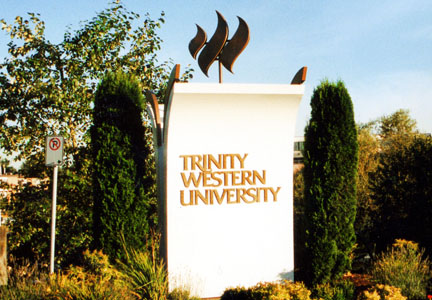
Once again, Trinity Western University has received a firm “no” from the courts in its bid to have its proposed law school accredited by the Law Society of Upper Canada.
 The Ontario Court of Appeal today unanimously dismissed the university’s appeal of a decision not to accredit its law school on the basis that its Christian community covenant discriminates against the LGBTQ community.
The Ontario Court of Appeal today unanimously dismissed the university’s appeal of a decision not to accredit its law school on the basis that its Christian community covenant discriminates against the LGBTQ community.
To be granted admission to the school, every TWU student must sign the covenant, which requires that among other things, members refrain from “sexual intimacy that violates the sacredness of marriage between a man and a woman.”
“My conclusion is a simple one: the part of TWU’s Community Covenant in issue in this appeal is deeply discriminatory to the LGBTQ community, and it hurts,” said appeal court Justice James MacPherson, who wrote on the court’s behalf.
The case, which started with the law society’s 28-21 vote to reject the law school’s accreditation in 2014, pitted religious freedom against equality rights. Today, the Court of Appeal found the LSUC’s decision not to accredit the law school was a breach of religious freedoms, but a justifiable one because the law society exercised a balancing act to reach its decision.
“Taking account of the extent of the impact on TWU’s freedom of religion and LSUC’s mandate to act in the public interest, the decision to not accredit TWU represents a reasonable balance between TWU’s 2(a) right under the Charter and the LSUC’s statutory objectives,” wrote MacPherson.
“While TWU may find it more difficult to operate its law school absent accreditation by LSUC, the LSUC’s decision does not prevent it from doing so,” the judge added. “Instead, the decision denies a public benefit, which the LSUC has been entrusted with bestowing, based on concerns that are entirely in line with the LSUC’s pursuit of its statutory objective.”
In a press release, Trinity Western University said it plans to take its appeal to the Supreme Court of Canada.
“The court correctly found an infringement of TWU’s rights,” said Earl Phillips, the executive director of TWU’s proposed school of law. “However, we are most disappointed that the court found the infringement to be justifiable. That finding is a serious limitation to freedom of conscience and religion under the Charter of Rights and Freedoms.”
TWU spokeswoman Amy Robertson called the decision “a loss for all Canadians.”
“Freedom of conscience and religion is the first of the fundamental freedoms mentioned in the Charter,” said Robertson. “It is deeply compromised by this decision, and everyone in Canada, religious or not, should be concerned.”
The LSUC said in a statement: “We are pleased that the court recognized the law society’s role in preventing and removing discriminatory barriers to access to the legal profession and, as the court put it, 'the desirable goal of promoting a diverse profession.'
"As the court said, 'one of the LSUC statutory objectives is to ensure the quality of those who practice law in Ontario.' Quality is based on merit, and merit excludes discriminatory classifications,” said the LSUC.
Paul Jonathan Saguil, counsel for Out on Bay Street and OUTLaws, interverners in the case, argued in favour of rejecting the appeal.
“We’re obviously delighted with the decision,” he says.
The appeal court released its decision unusually fast, just a few weeks after the case was heard on June 6-7. Saguil says there’s reason to suspect the timing was intentionally aligned with Pride celebrations in Toronto and elsewhere.
“We’re surprised to be honest that [the ruling] came so quickly but I guess the court had it in their mind that something is going on this month and they wanted to be part of the action,” Saguil says with a laugh.
“Obviously on the heels of what happened in Orlando, the community can use good news like this,” he adds.
At the Divisional Court, TWU argued the law society “ignored a binding precedent” in the Supreme Court’s 2001 decision in Trinity Western University v. British Columbia College of Teachers.
That ruling reversed the college of teachers’ decision not to accredit the university due to its covenant’s requirement that students refrain from gay sex. But in its ruling, the Divisional Court said the law society, unlike the teachers’ college, has a wider mandate involving “a much broader spectrum of considerations with respect to the public interest.”
Six other law societies — Alberta, Saskatchewan, Manitoba, New Brunswick, Prince Edward Island, and Newfoundland and Labrador — have granted accreditation to Trinity Western’s law school. Meanwhile, appeal court decisions are pending in Nova Scotia and B.C.
Update 2:45 pm: Comments added from LSUC.